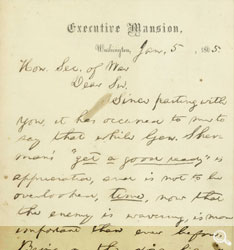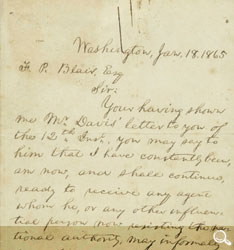

Hampton Roads Peace Conference
Francis Preston Blair Sr., an influential editor, visited Confederate president Jefferson Davis in Richmond, Virginia, on January 12, 1865. Blair proposed that if Davis renounced slavery and Southern independence, common cause could be made with the North to drive the French out of Mexico. Davis’s noncommittal response prompted Lincoln to send Blair back with this reply: "… I have constantly been, am now, and shall continue, ready to receive any agent whom he, or any other influential person now resisting the national authority, may informally send to me, with the view of securing peace to the people of our one common country."
On February 3, 1865, Lincoln and his secretary of state William H. Seward met with three Confederate peace commissioners—Vice President Alexander H. Stephens, R. M. T. Hunter, and John A. Campbell. The conference produced no meaningful result. On April 5, Campbell met with Lincoln privately to talk about peace. "As to peace, I have said before, and now repeat that three things are indispensable," Lincoln wrote. Those three things were the surrender of all Confederate military forces, the restoration of the Union, and the abolition of slavery.
Francis Preston Blair Sr. (1791–1876) began his career as a journalist and editor. His efforts to mediate a brokered peace proved to be quixotic. Photograph courtesy of Library of Congress.
Alexander Hamilton Stephens (1812–1883) served in Congress with Lincoln from 1847 to 1849; both were Whigs and outspoken critics of the Mexican War. As vice president of the Confederate States, Stephens often found himself at odds with Jefferson Davis. Photograph courtesy of the Abraham Lincoln Presidential Library and Museum.
Abraham Lincoln to Edwin Stanton, January 5, 1865
Abraham Lincoln to Edwin Stanton, January 5, 1865. On loan from the Abraham Lincoln Presidential Library and Museum.
On December 31, 1864, General William Sherman proposed to take the war to South Carolina, conducting it "as though it could only terminate with the destruction of the enemy…." Lincoln, having seen Sherman’s letter to General Henry Halleck, approved of the strategy.
Download text transcript of document (.pdf)
Abraham Lincoln to Francis P. Blair, January 18, 1865
Abraham Lincoln to Francis P. Blair, January 18, 1865. On loan from the Abraham Lincoln Presidential Library and Museum.
There was little hope, in Lincoln’s mind, for a successful outcome for Blair’s notion of peace talks. The Confederacy insisted that its independence be respected, something Lincoln refused to do.
Download text transcript of document (.pdf)



